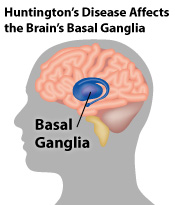[su_divider top=”no” style=”double” divider_color=”#952524″ link_color=”#952524″ size=”2″ margin=”10″]
What is Huntington Disease? How to manage it? What are the precautions to be taken? What are the signs and symptoms? What is the cause of this disease? How to treat it? How can homeopathy help you? All of this answered, in this post and of course our doctors always there to help you. Just fill in your details in the form down below and we will answer all your questions for FREE!
[su_divider top=”no” style=”double” divider_color=”#952524″ link_color=”#952524″ size=”2″ margin=”10″]
[sc name=”query”]

What is Huntington’s Disease?
Huntington disease is a genetic, autosomal dominant, neurodegenerative disorder characterized clinically by disorders of movement, progressive dementia, and psychiatric problems along with cognitive decline.
Huntington’s disease gets noticeable in mid-adult life. Huntington disease is also one of the most common causes of abnormal involuntary writhing movements called chorea that is why the disease used to be called Huntington’s chorea.
Who is prone to get affected by Huntington’s Disease?
Huntington disease affects individuals of mid adult life. The symptoms can begin at any age from infancy to old age but usually begin between 35 and 44 years of age.
It can affect Europeans more than Asians or Africans.
What are the signs and symptoms of Huntington’s Disease?
• Choric movements:- Early motor symptoms often include dystonic posturing and rigidity.
• Frequent and irregular jerking of the body.
• poor articulation of speech may be prominent with grunts and grimaces.
• Mental status exam
• The patient appears older than the stated age.
• The patient is well oriented in all spheres.
• The patient appears alert.
• Affect is appropriate.
• The mood is euthymic.
• Eye contact can be described as limited.
• Speech is illogical, incoherent, garbled, and not goal-directed.
• An increased risk for suicidal and homicidal occasionally accompanied by paranoia.
• Recent memory appears moderately to severely impaired. Remote memory is not impaired.
• Psychomotor activity:- choreic movements and hyperactivity.
• There are delusions, hallucinations, and violent ideas occasionally.
• Regarding perceptual functioning, the patient has hallucinations and none are evident.
• Attitude can be described as cooperative but disinterested.
• The patient verbalizes displays no awareness of problems and does not see the consequences. Judgment is poor.
•concentration deficit is characterized by an inability to attend and maintain focus.
• The patient is not reflective and unable to resist urges.
• The gait is disjointed and poorly coordinated.
• The manual dexterity tasks are impaired.
• Cognitive symptoms include the following:
• Attention, judgment, and executive functions may be seriously deficient at a very early stage whereas Memory is not impaired until the disease is progressive in late stages.
•Dementia early signs often include forgetfulness, disorganization.
• Free recall may be severely impaired.
Memory deficits involve both recent and remote function. Skilled motor-procedural learning deficits are reported.
Few features like Insight, orientation, information related to facts, and overall IQ scores are preserved relatively well into the disease process.
• Verbal skills are discussed as follows:
• Verbal skills are the least impaired in patients with HD.
• The fluency is reduced.
• Letter and category fluency is also impaired.
• There is a deficit in Sensory-motor which leads to poor olfactory perception, slow sequential.
What investigations are advised in cases of Huntington’s Disease?
Laboratory studies to be done are as follows:-
• DNA repeat expansion
• Dopamine homovanillic acid in cerebrospinal fluid
Imaging studies to be done are as follows
• Computed tomography or magnetic resonance imaging
• Single photon emission computed tomography scanning
Other tests to be done are as follows
• Wechsler memory scale-revised
• Wisconsin card scoring test
Histological findings of the striatum
What treatment is advised in cases of Huntington’s Disease?
Medications to be given are as follows:-
• Antipsychotics
• Benzodiazepines
• Anticonvulsants
• Antidepressants
In surgical care, there is only one solution that is a neural transplant.
Is Huntington’s Disease curable?
Huntington’s disease has a great impact on patients’ physical and psychosocial well-being, the latter being more severely affected.
What is the differential diagnosis of Huntington’s Disease?
• Alzheimer disease
• Tourette syndrome
• Wilson disease
• Parkinson disease dementia
For more information, you can visit NIH and MayoClinic.
Huntington Disease
[su_divider divider_color=”#952524″ link_color=”#952524″ size=”2″ margin=”10″]
[sc name=”know-your-doctor”]
[sc name=”more-links-diseases”]

